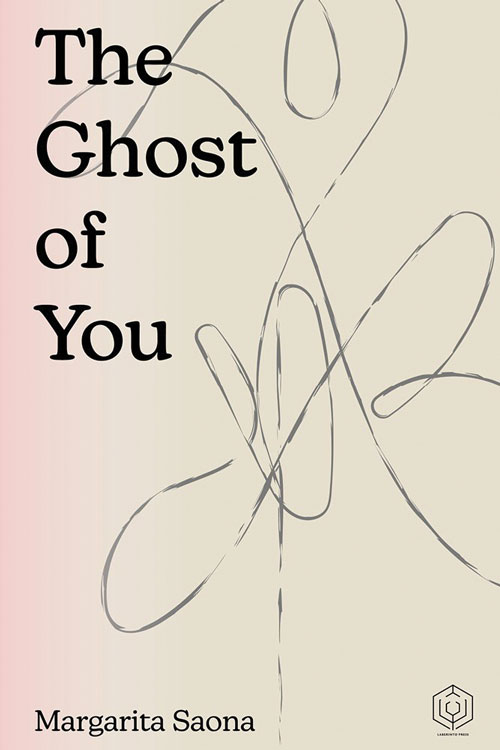
by Margarita Saona
translated by Luciana Erregue-Sacchi, with Lindsay Kikunen and Margarita Saona
LABERINTO PRESS
2023/$23.00/140 pp.
Sometimes an author’s Twitter (“X”) bio reveals more than the facts. This is true of the Peruvian-born writer/scholar Margarita Saona, whose profile appears as follows: “Reader. Writer of very short fiction. Teacher. Author of Tin Heart and Despadre. Martial artist. Heart transplant recipient.” This stylistic restraint and suggestive juxtaposition exemplifies what Saona’s publisher and translator, Luciana Erregue-Sacchi, calls the author’s “sparse, clinically precise yet mysterious prose.” It is a disciplined toughness conjoined with open-hearted vulnerability, and it is a sensibility that infuses the marvellous, strange worlds of The Ghost of You.
In 53 formally inventive short stories that range in length from a few pages to a single, aphoristic sentence, Saona experiments with a lightly surrealist treatment of themes related to memory, love/disillusion, loss, the transitory nature of identity, estrangement and disorientation in space and time. An early prose-poem-length narrative entitled “A Dream” compares dreams to “a game or a map”—a game whose “rules” aren’t clear and a map whose legends are “unreadable.” Saona’s deftly controlled stories are dreamlike in this game-map/map-game way: they are outlines of situations that we trace only with a shadowy sense of uncertainty, as when trying (and failing) to recall the full-bodied depths of a dream. These are deliberately cloudy weird little worlds in which the hypothetical, metaphorical and actual frequently blur, worlds often peopled by fantastical characters (high-wire acrobats, clock-eating children) but nevertheless recognizably modern in their excavation of (urban, migratory, dystopian) alienation, pain and fear.
In effect, Saona’s vignettes autopsy the bare bones of their dramatic situations. The stories inspect the tissue of connections and phantom limbs that make up lives: the after-presences of lost “you’s”, who are sometimes named and sometimes left to be inferred; the contingencies (or “fate”?) of fleeting intersections and uncanny near misses between strangers—commuters or neighbours with unknown affinities; the unspoken emotional chasms that can yawn between intimates—lovers or family members, such as the disenchanted daughter in “Full Moon.” Only rarely, as in “Motherless,” does a note of sentimentalism encroach on Saona’s dispassionate dissection of “this universe made of remains.” It is a haunting “frail harmony of odd things” and “lost things” that bind Saona’s collection, and while some of the daringly shorter pieces might be hard to pull off as stand-alone “stories,” they work as evocative stitches in context of the collection as a whole. That said, the standouts here are the more substantive stories, such as the superb “Memory Diptych,” a two-part narrative juxtaposing the scenario of a man who tries but fails to forget a failed love against the scenario of a man who tries but fails to remember his lost lover.
Margarita Saona is an accomplished writer and scholar whose works include multiple creative and critical books. All the more reason for providing this seasoned author with “an English-speaking home,” as Laberinto Press has done. Small-scale production initiatives such as Laberinto, which expressly seek to promote cultural diversity by translating literary works from under-represented languages and diasporic writers, are an essential counter to an overwhelmingly Anglocentric publishing industry and global translation flows. It is especially thrilling to see such a new initiative pop up here in Alberta. Edmonton-based and new, this press deserves support on principle alone. But if Laberinto Press keeps publishing literary work as entrancing as The Ghost of You, readers will be buying the books anyway.
C.S. Wiesenthal is an Edmonton writer and a professor emeritus in the Department of Film and English at the U of A.
_______________________________________

